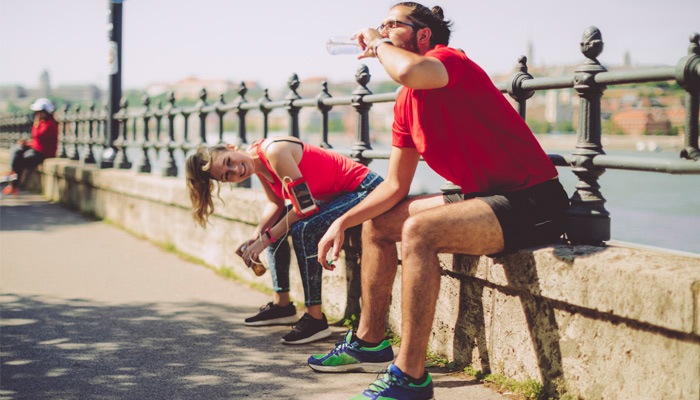How to prevent heavy legs while running
1. Warm up
We’ve all heard this advice before, but it is worth taking heed. Warming up before exercise encourages more efficient blood flow to the muscles thus allowing them to contract more efficiently. This should help you get the most out of your workout, whilst also preventing the onset of heavy legs.
An effective warm up will also deliver nutrients to the muscles more efficiently. This, in turn, can prevent a quick build-up of lactic acid – too much lactic acid is known to contribute to muscle aches and even a burning sensation in the limbs.
The ideal warm up should last for at least ten minutes and it should cover all muscles. Take a look at our blog ‘Stretches for runners’ for more information and easy to follow videos.
2. Adjust your route
Even though you may have managed to run 10km on Monday, that doesn’t mean you will be able to run the same distance or more on Tuesday. That’s because fatigue in the legs can build up over several days. Therefore, instead of doing the same run over and over, it is essential to allow yourself short runs, or rest days in between long runs. On the whole, it is more important to ensure your run is of a high quality, rather than trying to achieve a certain distance. This will strengthen your muscles and improve performance in the long run.
3. Adjust your stride
Sprinting in short bursts, and keeping the pace slower in between, is thought to be a more effective training regime than continuing to run at a moderate pace. That’s because this approach builds muscle strength and fitness.
As soon as you feel your legs getting tired, try to lengthen your stride, without increasing the pace. This will stretch your muscles and disperse the build-up of lactic acid. As I’ve already mentioned, too much lactic acid is a contributing factor in heavy, painful legs whilst running.
4. Adjust your focus
Running along a stretch of straight road with nothing to look at, or pounding it out on a treadmill in the gym, can be pretty dull. Therefore, with nothing else to focus on, it is likely you will soon become absorbed in the tired feeling of your legs.
To distract yourself from this, try listening to music or a podcast. Alternatively, running a new route, or a route with lots of twists and turns, should give you something else to turn your attention to.

How to relieve heavy legs after running
5. Stretch
Just as warming up before a run is important, so too is stretching out your muscles afterwards. If you do not do this, your muscles are more likely to cramp and become painful the next day. Stretching your muscles also helps to minimise the effects of lactic acid in the muscles, and also makes you less prone to developing injuries.
6. Rest
A small amount of rest will speed up the recovery process, and prevent further injury from occurring. Rest will also help ensure your legs are ready for their next run, should you decide to do one in the days ahead.
Our blog ‘How to recover from a workout’ will provide more information about what to do to help your body after a period of exercise.
7. Massage your legs
If your legs need that extra bit of help to get moving the next day, then a massage may be just the thing. This encourages blood flow to the deep tissues thus removing waste products such as lactic acid from the muscles. Not only that, a massage may encourage nutrients and water to enter the muscles, therefore, repairing and restoring the tissue.
Massages are a particularly good idea if you are training hard and regularly, as this also helps to prevent injury to muscle.
8. Check for injuries
As a runner, the worst thing you can do is run on injured joints or muscles. Not only will your legs feel very painful, but it is likely to cause lasting damage. Therefore, do not battle on regardless of aches and pains, and do not ignore warning signs of pain and muscle fatigue as developing strains, sprains or stress fractures will take you off the running scene for a long time. It’s definitely not worth running for an extra mile if it means you can’t put your running shoes on for the next couple of months!

Remedies for tired legs
9 – Watch your diet
Not only is it important to run whilst full of nutrients to sustain you, but it is also critical to stay properly hydrated. Just ensure you take small sips, however, rather than big gulps as, coupled with the movement of running, too much water has the potential to cause digestive upset. If you are going for a particularly hard or long run, you could consider taking an energy bar with you as well.
You need to feed your muscles by giving them the correct balance of protein, carbohydrate, healthy fats and salt. Wholegrain varieties of bread, pasta and rice are higher in fibre and energy than their white or refined counterparts. Also, treating yourself to a small piece of dark chocolate after each run will not do any harm.
Our blog, 'What to eat to recover from your run' will give you more tips on what a runner's diet should include.
10 – Herbal gels
Herbal remedies can be very beneficial for those experiencing heavy legs after running. Aesculus, or horse chestnut, for example, is known for its beneficial effects on the venous system. It tightens blood vessels and relieves the feeling of heaviness in the legs. Fresh extracts of Aesculus can be found in A.Vogel’s Venagel.
If you are suffering from muscular aches and pains, then licensed herbal remedy Atrogel may be just the thing to help you. It is made from freshly harvested Arnica, which has anti-inflammatory and contains pain-killing properties.
My Top Tip:
Apply 2-10 cm of Atrogel between 2 and 4 times daily.
|
Originally published on 26 July 2014 (updated on 28 May 2019).





 Looking for a treatment to relieve pain in conditions such as muscle aches or pains, stiffness, rheumatic pain or after sporting injuries?
Looking for a treatment to relieve pain in conditions such as muscle aches or pains, stiffness, rheumatic pain or after sporting injuries?

